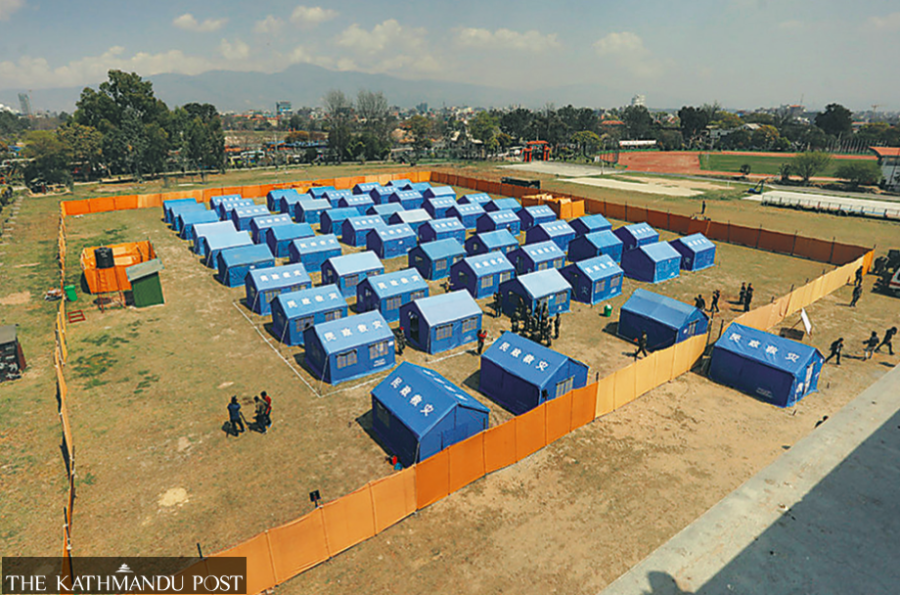Health
Coordination is key to fighting the pandemic, but it is lacking at all levels
Covid-19 Crisis Management Centre wants Health Ministry to come up with a plan to check virus spread. Ministry says its suggestions are not followed and Centre is responsible.
Arjun Poudel
Last month, senior officials of the Ministry of Health and Population were deployed to all seven provinces to assess the management in the first and second waves of the Covid-19 pandemic.
The litany of complaints from health workers as well as people’s representatives in local governments was similar: insufficient financial resources, not enough antigen test kits, lack of viral transport medium needed for polymerase chain reaction tests, and non-payment of the promised allowances to health workers, according to multiple ministry officials the Post talked to.
“Like at the centre, we found a lack of coordination as agencies under provincial and local governments did not take the risks of the pandemic seriously enough,” an official at the Health Ministry who was deployed to one of the provinces told the Post, asking not to be named.
“I am not authorised to speak to the media, but what we found is we could have managed the pandemic far better than what happened, had all agencies concerned owned their responsibilities.”
As the official pointed out, there still seems to be no coordination at the centre in fighting the pandemic, 18 months into it.
The Covid-19 Crisis Management Centre, formed as per the May 20 Covid-19 Crisis Management Ordinance, has the responsibility of taking the necessary measures for controlling the spread of the pandemic and preparing the policies needed for the purpose. But it points the finger to the Health Ministry to come up with plans of action.
“We have held several rounds of meetings with Health Ministry officials and officials of other ministries but Health Ministry officials have not presented any plan for better and effective management of the pandemic,” Nurhari Khatiwada, spokesperson for the Covid-19 Crisis Management Centre, told the Post.
“We have been trying to convince them for better coordination and cooperation.”
The Centre is headed by a retired Nepal Army lieutenant general despite the Covid-19 pandemic being a public health issue. It has representatives from the home, commerce, and health ministries as well as security agencies.
The Health Ministry, in turn, points to the Covid-19 Crisis Management Centre, saying it should be coordinating and giving directions.
“The CCMC was established to coordinate among all the agencies concerned, and it is responsible for taking the necessary measures [to control the pandemic] and giving directives to the agencies concerned,” Dr Samir Kumar Adhikari, joint spokesman for the Health Ministry, told the Post.
The Centre has held meetings with the representatives of several other ministries, according to Khatiwada.
The current incarnation of the Covid-19 Crisis Management Centre is different from the one formed earlier and has the sole responsibility of responding to the pandemic.
On March 29 last year, the Covid-19 Crisis Management Centre was formed with the then deputy prime minister as its head. Several ministers were members, but the Centre had little to show in terms of its efforts to check the spread of the pandemic. When the second wave of the pandemic hit the country in April this year, the then government headed by KP Sharma Oli issued the Covid-19 Crisis Management Ordinance. It appointed Balanada Sharma, who was coordinator of the Army Integration Special Committee during the peace process, as the chief of the Centre.
But it seems to be relying too much on the Health Ministry.
“The chief executive officer has been trying to convince Health Ministry officials for cooperation and coordination,” said Khatiwada. “Without the help of all agencies concerned, this pandemic cannot be overcome, and the role of the Health Ministry is very much important in containing the pandemic.”
Experts say that this pandemic is no less than a war, and without better coordination and cooperation among all state agencies and the general public, the war cannot be won.
“We are still struggling to overcome the pandemic, so coordination is still important,” Dr Biraj Karmacharya, an epidemiologist at Dhulikhel Hospital, told the Post.
The Health Ministry says that its directives and recommendations are not followed.
“For example, testing should be ramped up, and for that we have dispatched hundreds of thousands of antigen testing kits to local governments, but tests are not happening in sufficient numbers,” said Adhikari, joint spokesperson for the Health Ministry. “Public transportation and gathering should be restricted and monitored and crowding should be prohibited but nothing has happened.”
On the other hand, local governments complain that they are just given responsibilities without either the provincial or federal government agencies inquiring about their problems.
“Neither the central government nor provincial government agencies contact us to inquire about our problems and preparations to deal with the pandemic,” said Uddhav Prasad Kharel, mayor of Budhanilkantha Municipality in Kathmandu. “With the available resources, we have tried to do what we can, including managing isolation centres.”
With the rapid spread of the Delta variant, which is more transmissible than other strains of SARS-CoV-2, causing a spike in the number of new cases in recent days, public health experts say that better preparations are needed to lessen the loss.
However, there has been little preparation.
Even the construction of holding centres at border crossings between Nepal and India, started before the start of the second wave of the pandemic, has not been completed. The Health Ministry is not even aware of the progress.
“We are not aware of the completion and handover of the holding centres as of now,” said Adhikari. “Nepal Army was tasked with setting up one 1,000-bed holding centre in each of the seven provinces and one also in Kathmandu before the start of the second wave.”
It will still take some time for them to be completed, according to Santosh Ballav Poudyal, spokesperson for Nepal Army, as the national defence force has already signed a contract to set up six holding centres.
“Nepal Army has already signed a contract to set up six holding centres. We are working on completing their construction within two months, and we hope that they will be ready before the third wave hits the country,” Poudyal told the Post. “Due to land acquisition problems, work has not started in two places.”
There were 31,298 active cases throughout the country on Sunday, according to the Health Ministry. In the last 24 hours, 1,981 people tested positive in polymerase chain reaction tests. The positivity rate continues to be high—it was 24 percent on Sunday.
Along with reviving quarantine and isolation centres, testing should be ramped up and contact tracing and isolation of the infected people should be made effective, experts say.
Despite the mantra being repeated for the last 18 months, neither has testing been increased nor contact tracing made effective.
“The only way to contain the spread of any virus including the Delta variant is by increasing testing, isolating patients and making contact tracing effective,” Dr Baburam Marasini, former Director at the Epidemiology and Disease Control Division, told the Post.
“I fail to understand the government policy. Why have all these measures, without which the pandemic cannot come under control, been given up?”
When Health Ministry officials were sent to the provinces last month, one of their tasks was to gather inputs from the agencies under the provincial and local governments to start preparations for a possible third wave.
But to bring the pandemic under control, the writing is clearly on the wall–testing, contact tracing, ramping up immunisation, and setting up infrastructures, among other measures–according to experts.
“These are basic things,” said Karmacharya, who is also the head of the Department of Community Programme at Dhulikhel Hospital.
Creation of many agencies, which only issue directives, is counterproductive as that hinders coordination and cooperation, according to Marasini, the former government official.
“Instead of creating agencies that implement directions, authorities keep increasing the agencies to give orders only,” said Marasini.
“Had the government increased health workers including doctors, and hired volunteers for contact tracing and lab technicians for testing, things would have been different.”




 25.15°C Kathmandu
25.15°C Kathmandu















